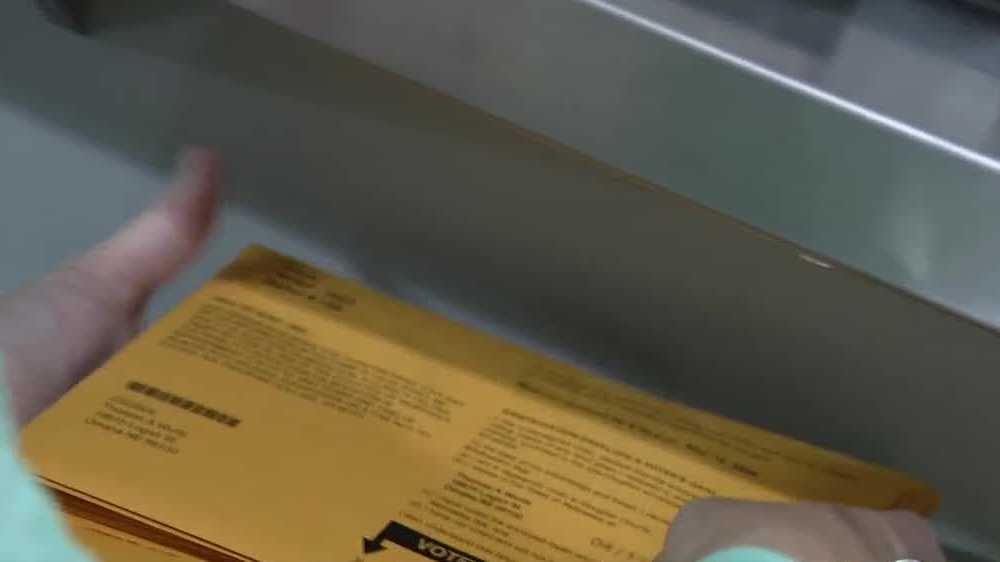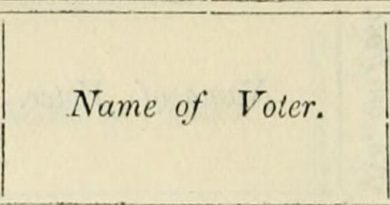‘Each person has one vote and one vote only’: Behind-the-scenes look at ballot security in Douglas County

With various theories rising periodically across the country about voter fraud and bad elections, Douglas County Election Commissioner Brian Kruse is confident his office is ready for the Nebraska Primary.“We’ve never had a problem in Douglas County. We don’t want a problem,” Kruse said as he gave KETV NewsWatch 7 a behind-the-scenes look at the system meant to protect ballot integrity.Nebraska 2024 Primary Election guide: Click here to see the races, registration, important dates and moreThe afternoon we were there, the office was handling both requests for ballots, and completed ballots.They all come in through the county’s 13-drop boxes or by mail.Kruse said the drop box outside the election commission is emptied three times a day.“Every drop box takes two keys and two people of differing parties,” Kruse said two people, also from differing political parties, do the same thing at the post office twice a day.“So, it’s not sitting on the truck all day,” Kruse said.Inside each drop box is a bag which is sealed and brought back to the main office where that seal is cut and the number and location on it logged.“And then this seal will stay with these ballots,” Kruse said, “So then once you open this up, you can see what’s in there, some are fuller than others.”In the office, they separate the completed ballots, which are in yellow envelopes from the requests for ballots, which are the green cards.They are all organized and then put into trays that correspond with the drop box locations.When a request for a ballot comes in, workers have to verify signatures and for the first time in Nebraska, the Voter ID information.Get the Facts: What to know about Nebraska’s new voter ID lawPeople who want a ballot have to include a photocopy of their state ID or driver’s license or write down the information on those pieces.If everything checks out, we go into a secure location for the next step.“You have to have double authentication to get in here,” Kruse explained, “Swipe plus a pin code.”Behind the door, is a room full of machines.Some of them process and print the ballots and envelopes for the specific requests that have come in.Before the ballots go back out, they must go to a section of the office called consolidation. It’s a step where humans, and not machines, put everything together.We saw long-time election workers Maxine and Mike combining the blank ballot, an instruction sheet, a return envelope, and the outgoing envelope.“It’s monotonous work but it’s very important,” said Kruse.It is a lot of work.When we were there in mid-April, the office had already processed 65,000 requests.“In Douglas County we’re pretty much 50% early voters, 50% polling place,” Kruse explained.When a completed ballot is returned Kruse said there is a strict process to protect its integrity.Back in the secure room where requests are processed, the completed ballot envelopes are put into different machines.Those machines slice open the envelope and time stamp them.Then more workers, like Betsy, verify the signatures and the Voter ID info.They are able to access other online resources, like the Department of Motor Vehicles, to help them with that verification process.If everything checks out on the ballots, they are taken into another secure room.“There are certain rooms that you have to have a key card, plus a pin code,” Kruse said, “It’s usually where there’s live ballots.”The ballots go on shelves where they will wait to be counted.Inside that already secure room, are two safes.They are for the thumb drives where the actual voting numbers will be stored.One of the safes holds the thumb drives before the counting, when they are empty.The other safes hold the drives when they have results on them.“Because these safes are fireproof, or fire resistant,” Kruse said.There are nine machines that do all the counting.All of them are from Omaha-based Election Systems and Software.“These machines are never hooked to the Internet or to each other,” Kruse said.Each machine can count 250-pieces of paper every minute.The military-grade thumb drives are in locked compartments on the machines.After the votes are loaded onto them, the nine thumb drives are put into an air gap computer.Kruse said that’s a stand-alone laptop that has never been hooked to the internet.That laptop then combines all the votes and burns the results onto a compact disc.That disc is taken to the commission’s IT department when the results are then pushed out to the public.Kruse said each step of the process is closely watched.“We always have two people of differing parties run the machines,” and Kruse said they are not the only ones watching, “We’ve got security cameras in both corners that are recording everything.”Kruse said the office recently put in an enhanced, high-def, video surveillance system.There are 39-cameras inside the commission’s building alone and then thirteen more at the drop boxes across the county.“I mean everywhere inside and outside is under surveillance,” said Kruse, “We do this for peace of mind, for, you know, the public, for the voters and also for our staff.”Kruse said everything they are doing and have done means that voter fraud is basically non-existent in Douglas County.“I just want to assure and re-assure voters that your voice is heard in Douglas County. It’s safe. It’s secure. Each person has one vote and one vote only,” according to Kruse.And he added that just in case someone thinks there has been fraud, he has a ready response.“Just because your candidate may not win does not mean there was election fraud,” Kruse said, “It simply means the other candidate got more votes.”The Nebraska Primary election is May 14th.Click here for the latest headlines from KETV NewsWatch 7
With various theories rising periodically across the country about voter fraud and bad elections, Douglas County Election Commissioner Brian Kruse is confident his office is ready for the Nebraska Primary.
“We’ve never had a problem in Douglas County. We don’t want a problem,” Kruse said as he gave KETV NewsWatch 7 a behind-the-scenes look at the system meant to protect ballot integrity.
Advertisement
Nebraska 2024 Primary Election guide: Click here to see the races, registration, important dates and more
The afternoon we were there, the office was handling both requests for ballots, and completed ballots.
They all come in through the county’s 13-drop boxes or by mail.
Kruse said the drop box outside the election commission is emptied three times a day.
“Every drop box takes two keys and two people of differing parties,” Kruse said two people, also from differing political parties, do the same thing at the post office twice a day.
“So, it’s not sitting on the truck all day,” Kruse said.
Inside each drop box is a bag which is sealed and brought back to the main office where that seal is cut and the number and location on it logged.
“And then this seal will stay with these ballots,” Kruse said, “So then once you open this up, you can see what’s in there, some are fuller than others.”
In the office, they separate the completed ballots, which are in yellow envelopes from the requests for ballots, which are the green cards.
They are all organized and then put into trays that correspond with the drop box locations.
When a request for a ballot comes in, workers have to verify signatures and for the first time in Nebraska, the Voter ID information.
Get the Facts: What to know about Nebraska’s new voter ID law
People who want a ballot have to include a photocopy of their state ID or driver’s license or write down the information on those pieces.
If everything checks out, we go into a secure location for the next step.
“You have to have double authentication to get in here,” Kruse explained, “Swipe plus a pin code.”
Behind the door, is a room full of machines.
Some of them process and print the ballots and envelopes for the specific requests that have come in.
Before the ballots go back out, they must go to a section of the office called consolidation. It’s a step where humans, and not machines, put everything together.
We saw long-time election workers Maxine and Mike combining the blank ballot, an instruction sheet, a return envelope, and the outgoing envelope.
“It’s monotonous work but it’s very important,” said Kruse.
It is a lot of work.
When we were there in mid-April, the office had already processed 65,000 requests.
“In Douglas County we’re pretty much 50% early voters, 50% polling place,” Kruse explained.
When a completed ballot is returned Kruse said there is a strict process to protect its integrity.
Back in the secure room where requests are processed, the completed ballot envelopes are put into different machines.
Those machines slice open the envelope and time stamp them.
Then more workers, like Betsy, verify the signatures and the Voter ID info.
They are able to access other online resources, like the Department of Motor Vehicles, to help them with that verification process.
If everything checks out on the ballots, they are taken into another secure room.
“There are certain rooms that you have to have a key card, plus a pin code,” Kruse said, “It’s usually where there’s live ballots.”
The ballots go on shelves where they will wait to be counted.
Inside that already secure room, are two safes.
They are for the thumb drives where the actual voting numbers will be stored.
One of the safes holds the thumb drives before the counting, when they are empty.
The other safes hold the drives when they have results on them.
“Because these safes are fireproof, or fire resistant,” Kruse said.
There are nine machines that do all the counting.
All of them are from Omaha-based Election Systems and Software.
“These machines are never hooked to the Internet or to each other,” Kruse said.
Each machine can count 250-pieces of paper every minute.
The military-grade thumb drives are in locked compartments on the machines.
After the votes are loaded onto them, the nine thumb drives are put into an air gap computer.
Kruse said that’s a stand-alone laptop that has never been hooked to the internet.
That laptop then combines all the votes and burns the results onto a compact disc.
That disc is taken to the commission’s IT department when the results are then pushed out to the public.
Kruse said each step of the process is closely watched.
“We always have two people of differing parties run the machines,” and Kruse said they are not the only ones watching, “We’ve got security cameras in both corners that are recording everything.”
Kruse said the office recently put in an enhanced, high-def, video surveillance system.
There are 39-cameras inside the commission’s building alone and then thirteen more at the drop boxes across the county.
“I mean everywhere inside and outside is under surveillance,” said Kruse, “We do this for peace of mind, for, you know, the public, for the voters and also for our staff.”
Kruse said everything they are doing and have done means that voter fraud is basically non-existent in Douglas County.
“I just want to assure and re-assure voters that your voice is heard in Douglas County. It’s safe. It’s secure. Each person has one vote and one vote only,” according to Kruse.
And he added that just in case someone thinks there has been fraud, he has a ready response.
“Just because your candidate may not win does not mean there was election fraud,” Kruse said, “It simply means the other candidate got more votes.”
The Nebraska Primary election is May 14th.


